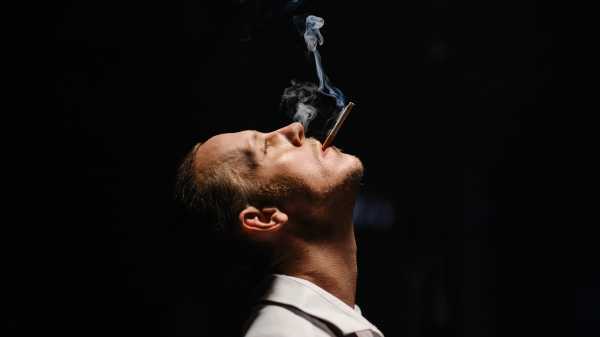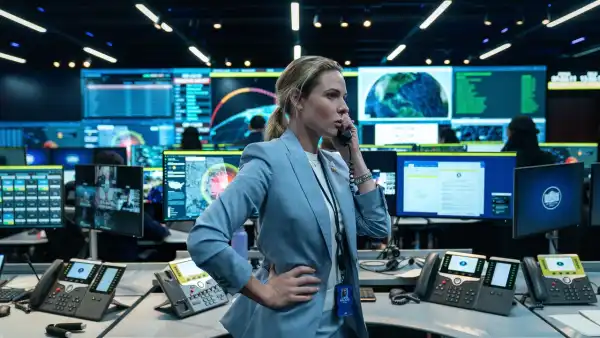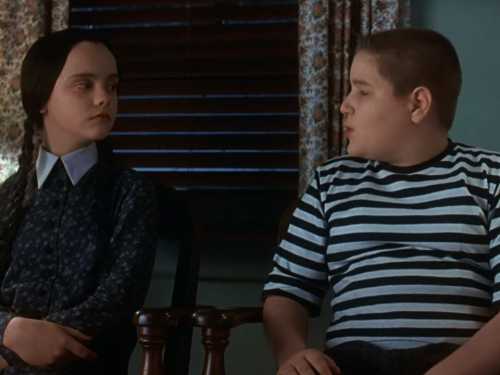
The first time we glimpse the titular hero of “My Son Hunter,” a chaotic, low-budget agitprop film that the conservative Web site Breitbart released last week, he is seen entering a night club in L.A. (The movie, in fact, was shot in Serbia, a kind of Los Angeles of the mind.) Pictured from the back in what strains to seem a one-take shot, like a cut-rate Henry Hill entering the Copacabana in “GoodFellas,” Hunter Biden, the President’s son (played by the British actor Laurence Fox), glad-hands his way through the venue; snorts a line of cocaine before grandly, if inexplicably, disposing of more than half of it on the floor; and enters a V.I.P. room, where he commences to tell everyone what’s what. “My friends, it’s time to fucking party!” he booms, as he settles in to watch exotic dancers cavorting under the watchful eye of a femme-presenting host named Lorenzo, who decides, as one often does at a strip show, to announce their pronouns to the audience before the performance begins. At one point, a dancer named Kitty breaks the fourth wall, “The Big Short”-style, turning to the camera and saying, “Don’t judge me. I’m doing this to pay off my college debt.”
This is the America liberals want, the movie seems to suggest: powdered drugs; club rats who are persnickety about their confusing gender identities; scantily clad dancers abandoning their womanly dignity in order to afford an education (wait, whose fault is that?). But “My Son Hunter” has loftier ambitions than offering a cultural critique of debauched Dem cosmopolitanism. Its professed intention is to reveal the alleged corrupt business relationship between the President and his son. The movie promises to include, among its revelations, “Sex, Prostitution, Drugs, Cronyism, Money Laundering, More Sex, a Laptop from Hell,” not to mention “Chinese Spies, Ukrainian ‘Businessmen,’ ” and “the Selling Out of America.” As they say, don’t threaten me with a good time!
Hunter, who is now fifty-two, has lived a life rife with trauma. When he was a toddler, his mother and baby sister died in a car crash; then, in 2015, he lost his brother, Beau, President Biden’s eldest son, to a brain tumor. For much of his adult life, he has struggled with drug and alcohol addiction. (“It’s a never-ending tunnel,” he told this magazine, in a 2019 profile. “You don’t get rid of it.”) And yet, in recent years, there’s been a widespread fascination with the more lurid-seeming elements of Hunter’s saga, which read like a combo of the prime-time soap “Dynasty” and the punk history “Please Kill Me.” There’s his romantic relationship with his late brother’s widow; his 2019 marriage to Melissa Cohen, a woman whom he met a week prior to wedding; the bacchanalian hookers and crack benders that reportedly sent him zigzagging between luxury hotels and fleabag motels; and the Arkansas woman who sued him for paternity of her child in 2019. From a narrative perspective, these tales positioned Hunter as the juicily libidinal alternative not just to the desperate-for-Daddy’s-approval Trump children but also to the snoozy bloodlessness of the Biden ticket itself. (As a friend of mine once tweeted, “hunter biden is the hunter s. thompson of our generation.”) In October, 2020, twenty days before the most recent Presidential election, a cache of leaked e-mails and photographs added to the mess. The files, found on a laptop that Hunter apparently failed to pick up from a repair shop in Delaware—and that was later seized by the F.B.I.—pointed to a life mired in drug use, wild sex, family strife, and convoluted business deals.
The laptop, which Hunter and his lawyers have yet to confirm or deny having belonged to him, was first reported on by the New York Post, while mainstream news organizations treated it with skepticism. (Recently, it emerged that Twitter and Facebook, too, squelched the story in the run-up to the election, concerned that it was part of a disinformation campaign.) Conversely, Donald Trump supporters believed the files to be a “smoking gun”—evidence of President Biden’s improper involvement in business deals that his son had made with Ukraine and China. The laptop also serves as the narrative locus of “My Son Hunter,” a heady brew in which Hunter’s foibles are taken as merely the outward signs of a deep political conspiracy that goes all the way to the liberal top. It’s a story that, according to the actor Dean Cain, in an interview at the movie’s première, “needs to be told, and it hasn’t been by the mainstream media.”
Cain, whose most memorable role was as the male lead on ABC’s mid-nineties series “Lois and Clark: The New Adventures of Superman,” has been better known in recent years for his conservative opinions. Although he isn’t part of the cast of “My Son Hunter,” his profile matches that of several of the movie’s central players. These include the film’s director, Robert Davi, a singer and actor mostly recognized for playing heavies in eighties and nineties movies (a crooning tough in Richard Donner’s adventure romp “The Goonies”; a sleazy strip-club owner in Paul Verhoeven’s beloved turkey “Showgirls”), but who has more recently found his métier as an online Trump booster; the actress Gina Carano, who last year was fired from the TV show “The Mandalorian” after posting a comparison on Instagram between the supposed persecution of American Republicans and that of the Jews during the Holocaust; and Fox, who played the son of a marquess in 2001’s “Gosford Park,” and who, twenty years hence, ran for mayor of London under his own “Reclaim” Party, which seeks to fight political correctness, and won 1.9 per cent of the vote. None of these figures are what one would call A-list, which makes “My Son Hunter” feel like a movie that is conspiracy-minded on at least two levels—Hollywood’s betrayal of these industry aspirants dovetailing with the purported tricking of the American people by the President and his son. The offended, put-a-brave-face-on-it vibe of the project reminded me of the star-power lacuna that was Trump’s inauguration.
Technically, the rollout of Davi’s movie was muddled and inept. Although “My Son Hunter” prides itself in being a film that liberals “don’t want you to see,” it often seemed like Breitbart didn’t want me to see it, either: accessing the movie was an hours-long Via Dolorosa of error messages, unsent “watch codes,” and seemingly endless log-in attempts, all for the rather steep price tag of twenty-two dollars. (So much for the efficiency of private enterprise.) This mirrored the shambolic nature of “My Son Hunter” itself, an amateurish, often batshit, if very occasionally vulgarly amusing satire-cum-thriller-cum-melodrama-cum-propaganda-organ, which switches between modes with the head-spinning unexpectedness of a Surrealist cutup. The Hunter character is a laughable degenerate, but the drawn-faced Fox has little of the actual Hunter’s arguable good looks and charisma. Still, he is a crack-smoking, loose-woman-loving horndog who adores the good life, which we can tell from the wild party he throws for a dozen strangers at his bungalow on a set that is supposed to stand for the Chateau Marmont. (His conversant name-checking of John Belushi—“[He] died in the next bungalow. . . . He had some demons”—clashes oddly with what the movie conceives the famously luxe-bohemian hotel to be like, complete with corporate art on the walls that looks like it was borrowed from a Radisson in Dubuque.) To up the chaos, animated elements sometimes invade the screen, as when a lapdog of one of the party guests sprouts thought bubbles in which it introduces itself to Hunter as “Shirley” and warns him that all of the people in the room are “freeloaders,” or when a cartoon image of a frantically beating ticker flashes onscreen to represent Hunter’s heart after he does a line, only to be confusingly shown to slow its roll after he takes a hit of crack.
Much like his son, the President (played by John James, a onetime mainstay of “Dynasty”) also seems in a near-constant state of inappropriate arousal, repeatedly sniffing the hair of his Secret Service agent, played by Carano, and referring to Tara Reade, the aide who accused him of sexual assault, as “one sweet-smelling young lady.” Relying on zero actual proof, the movie also portrays the elder Biden as a criminal don who receives kickbacks from the shady international deals his son orchestrates. (“Sure as hell better still have my split!” he tells Hunter menacingly, at one point.) One especially insane sequence meant to illustrate this corruption involves the two Bidens dancing with a trio of Ukrainian oligarchs and a prostitute as dollar bills rain down on them and a “rap” track sounds. (Among the choice lyrics: “That’s the way how we play. . . . I’m cutting off my hoes.”) To top the portrait off, Joe is also, simultaneously, a senile nincompoop, who refers to Hunter’s laptop as a “top lop” and reminisces apropos of nothing about “Corn Pop.” (“He was a bad dude!”) Large swathes of the movie are given over to confusing “reënactments” of Hunter’s dealings with Ukraine and China, scenes which appear more than anything like a combo of Wikipedia-style summaries with really bad wigs. “It’s a country that shares its eastern border with Russia. And that eastern territory is rich in fossil fuels, so Russia wants it badly,” Carano’s Secret Service agent explains helpfully.
Kitty, the dancer we meet early on, isn’t a mere footnote to “My Son Hunter” but instead emerges in its course as the film’s quiet heroine. A so-called snowflake who participates in violent Black Lives Matter protests (that the mainstream media, naturally, bends over backward to describe as “peaceful”), Kitty, née Grace, turns to stripping after breaking ties off with her dad. (“I hate my father. . . . He’s a lawyer,” she tells Hunter by way of explanation.) Accompanying Hunter on his Chateau bender, she undergoes a reëducation, slowly realizing, with the help of Tyrone, the President’s son’s conveniently Black security guard, that she may have been wrong to believe the lies liberals have been feeding her all along. “I can’t seem to find anything but positive stuff on the Bidens,” she tells Tyrone, who patiently explains, “That’s because you’re using Google and the mainstream media! You have to use the alternative search engine.” It will surprise no one that by the end of the movie, Kitty, who has regained a newfound love and respect for her lawyer father—and, correspondingly, the law of the father—is dreaming of a world in which Hunter and his dad would be made to pay for their crimes.
“My Son Hunter” is the stuff of nutso conspiracy theorists, but the desire to understand exactly what has gone on behind the scenes with Hunter and his affairs makes sense to me, as it must for many others. (Earlier this week, New York magazine published a multi-thousand-word cover story detailing the minute ins and outs of the laptop saga.) There is even a point in the movie where the shady vagueness of some of Hunter’s international finance dealings is telegraphed quite well. In one flashback, which addresses Hunter’s involvement with Ukraine and the natural-gas company Burisma, on whose board he sat, allegedly receiving tens of thousands of dollars a month for his trouble, Hunter, seen in tight closeup, turns to the camera and says, “Look, here’s the deal. I can remember getting paid some money, but I can’t remember what for, can’t remember what we did with it.” A woman, apparently giving him a blow job, lifts her head from his nether regions and enters the frame. “Consulting,” she offers. “Yeah. Consulting!” Hunter responds, beaming.
Last year, I read “Beautiful Things,” Hunter’s memoir, and though I was impressed with the emotional vulnerability he showed in parts of it—especially in speaking about his relationship with the late Beau Biden, whose loss he clearly feels deeply—I was ultimately disappointed with the book, which read to me like a thoroughly vetted document, lacking much juice in its detailing of Hunter’s affairs, business and otherwise. (In response to the laptop scandal, he writes only, “I knew there was absolutely nothing they could do to take away this beautiful thing I’d built,” referring to the family he had recently started with his new wife. “Melissa and I simply went about our day. We made lunch. We took baby Beau to the beach to watch the sunset.”) There is surely much more truth in “Beautiful Things” than there is in “My Son Hunter,” but both texts seem to occlude the real Hunter Biden story, the entirety of which we might never know. ♦
Sourse: newyorker.com






